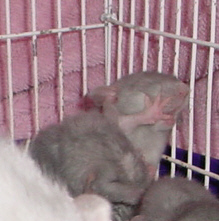Shaddup Already!
2006-01-08
Codependency in the Garden of Eden
This is an essay I wrote for a British Literature class while in college (6/15/00). I found it not long ago and really enjoyed reading it again. I'm pretty proud of it, even though my writing has improved since I wrote it.All the quotations are from Paradise Lost by John Milton. I didn't put the citations in because I wasn't sure how it would work and most everyone wouldn't have the same copy of the poem that I did.
It all started by a smartass comment made by me in the middle of my class, but I'm glad it did.
Oh yeah, it's national de-lurking month. If you read me, please drop a note or (preferably) a comment. I stole the following from trancejen:
______________________________________________________
Codependency in the Garden of Eden
Do you judge people as either right or wrong, good or bad? Do you have a hard time accepting your own mistakes? Do you resent it when others don�t take your advice? Do you compromise your own values in order to be accepted by others? Do you usually do what your partner wants to do, rather than follow your own wants? Do you spend a great deal of time pretending things are fine? Do you have trouble being alone? If you answered �yes� to many of these questions, you may be codependent. Fear not, you are not alone, there is evidence within John Milton�s Paradise Lost that Adam was codependent.
Adam�s biggest codependent characteristic was the fear of being alone. The first man must face this fear when Eve requests that they divide the work in the Garden of Eden, �Let us divide our labors, thou where choice/Leads thee. . .while I/ In yonder spring of roses intermixed/with myrtle, find what to redress till noon.� Adam manages to maintain his emotions while he discusses the issue of personal space with Eve. He begins by flattering her�naming the attributes that make her desirable, �for nothing lovelier can be found/In woman, than to study household good,/And good works in her husband to promote.� He then points out that Eve cannot be trusted to make appropriate decisions regarding trees, snakes and apples, �Since reason not impossibly may meet/Some specious object by the foe suborned,/And fall into deception unaware,/Not keeping strictest watch, as she was warned.� Finally, Adam allows Eve to leave when his own words begin to make sense to him, �But God left free the will.�
Although Adam patiently stated his case against Eve leaving on her own, his woman refused to take the advice, which caused Adam to feel resentment. His argument began with a mild statement of God�s wishes, �Yet not so strictly hath our Lord imposed/Labor, as to debar us when we need/Refreshment.� When Eve refuses to buy into this argument, Adam begins to tell Eve that he trusts her, but he doesn�t trust evil, �Not diffident of thee do I dissuade/Thy absence from my sight, but to avoid/Th� attempt itself, intended by our foe.� Finally, when Eve begins to question God, Adam�s anger and resentment become obvious, �O woman, best are all things as the will/Of God ordained them.�
In addition to loneliness and resentment, Adam also had a problem with denial. He was content to sit around thinking everything was fine. He watched Eve saunter off into the garden �with ardent look in his eye.� Adam knew full well that evil awaited his beloved beyond the flowers, but he stayed back and played the patient, oblivious husband. As �the hour of noon drew on, and waked/An eager appetite� within Eve, Adam sat �Waiting desirous her return� and �wove/Of choicest flow�rs a garland to adorn/Her tresses.�
The evidence of Adam�s codependency comes to a head when Eve returns from her outing. Knowing the ramifications of tasting of the fruit, Eve vows to keep Adam with her, �Confirmed then I resolve,/Adam shall share with me in bliss or woe.� Although Eve is not blameless in this situation, Adam is responsible for his own part in the eating of the sacred fruit. In classical codependent style, Adam forsakes his own values in order for Eve to accept him. It is obvious by his reaction to Eve�s return and story that he is aware of the seriousness of what she is asking, �while horror chill/Ran through his veins, and all his joints relaxed;/From his slack hand the garland wreathed for Eve/Down dropped.� However, he commits to eating the apple so that he may stay with Eve�re-enter Adam�s fear of being alone.
In an era of stories that end with �happily ever after,� we may expect that Adam ate the apple. Then he and Eve lived out their mortality in bliss. Alas, as most codependents know, there is no such thing as happily ever after. Even prior to eating the fruit of knowledge, Adam displays another trait of the codependent. He is unable to accept his own mistakes. He insists on placing the blame for his intended indiscretion on Eve, �And with thee hath ruined, for with thee/Certain my resolution is to die.� After eating the apple, Adam begins to dwell on the anger directed at Eve. He begins by whining, �O Eve, in evil hour thou didst give ear/To that false worm,� Then Adam follows with a good deal of finger-pointing, �Would thou hadst hearkened to my words, and stayed/With me. . .we had then/Remained still happy, not as now, despoiled/Of all our good, shamed, naked, miserable.� Finally, Adam ends his tirade with a well thought out I told you so, �I warned thee, I admonished thee, foretold/The danger, and the lurking enemy/That lay in wait.�
Finally Adam had trouble seeing Eve on a human level. Before her date with the snake, Adam saw his bride as being faultless. Of course, God may be partially to blame for creating �Eve with perfect beauty adorned.� Adam was apt to use words such as �My fairest. . .Heav�n�s last best gift, my ever new delight� to describe Eve. With feelings like �Yet evil whence? in thee can harbor none,/Created pure� Adam was setting himself up to be disappointed in Eve. Although he was faced with a fundamental violation of trust, Adam couldn�t help but put Eve on the pedestal one last time, �O fairest of creation, last and best/Of all God�s works, creature in whom excelled/Whatever can to sight or thought be formed/Holy, divine, good, amiable, sweet!�
Once Adam eats the fruit of knowledge, he begins to realize that Eve has her faults. However, he allows the pendulum to swing to the other extreme. Adam goes from thinking of Eve as perfectly good to accusing her of being evil, �Both good and evil, good lost and evil got.� Some good does come of the whole apple-eating mess because Adam begins to see where he may have gone wrong, �I also erred in overmuch admiring/What seemed in thee so perfect, that I thought/No evil durst attempt thee.� He goes on to say, �I rue/That error now, which is become my crime,/And thou th� accuser.� This partial admission of guilt is an important first step for Adam.
It should really come as no surprise that Adam would be codependent. In addition to the attributes mentioned before, the National Council on Codependence states that a codependent puts other�s need before their own. The perfect example of this is Adam giving of himself for Eve, �flesh of flesh,/Bone of my bone thou art.� In addition, a codependent feels incomplete when they aren�t in a relationship. It makes sense that Adam would feel incomplete without Eve, considering she was made from one of his ribs.
Even though John Milton had probably never heard of codependence, it can be argued that he used the characteristics of the disorder when writing of Adam in Paradise Lost. It should be a comfort to codependents everywhere that the condition has been around for centuries. Some may even argue that it is so deeply embedded in our roots that it can be seen within the first man, Adam. For this reason, I suggest that codepdents everywhere accept themselves as they are, curl up with John Milton�s Paradise Lost, take a bite out of an apple and say goodnight to the talking snake. All is right with the world and you are not alone.
Adam�s Serenity Prayer
God grant me the serenity to accept the things I cannot change
My God! She�s beautiful!
The courage to change those thins I can
Maybe if I tiled my head to the side and squint, she won�t look so nice.
And the wisdom to know the difference.
It didn�t work!
Bring on the apple!


